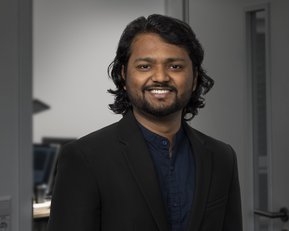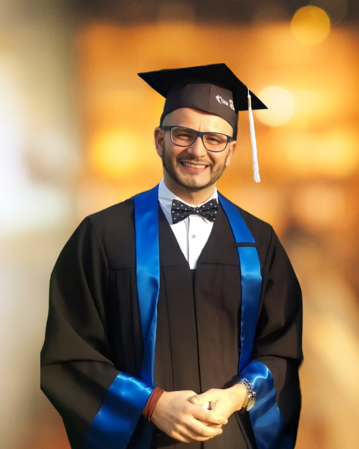
Our alumnus Hassan Hadeed graduated with a master’s degree in information technology and is a Team Lead Software Tester at QESTRIT GmbH.
Our alumnus Hassan Hadeed graduated with a master’s degree in information technology and is a Team Lead Software Tester at QESTRIT GmbH.

As a Software Testing Team Lead, my day usually starts with a team meeting to review test progress and address any roadblocks. A large part of my day is spent coordinating with developers, product managers and other stakeholders to ensure we meet our quality standards and deadlines. My responsibilities include planning and assigning tasks to my team, reviewing their work, and providing guidance and support. I also focus on continuous improvement by evaluating our testing processes and tools to increase efficiency and effectiveness
What excites me most about the software testing industry is the constant evolution and innovation. For example, the rapid advances in automation and AI-driven testing tools have changed the way we approach quality assurance, making the process more efficient and accurate. One particular experience that stands out is when our team implemented a new automation framework that reduced our regression testing time by 50%. This allowed us to focus more on exploratory testing and catch critical issues early. The challenge of staying abreast of the latest technologies and continuously improving our processes keeps me excited about my job every day.
In the next few years, I see my professional career evolving towards a leadership role in the software testing domain, such as (Test Manager, Test Director).
In order to achieve my goal of career advancement, I need to obtain several industry certifications and gain more hands-on experience. Specifically, I plan to obtain certifications in Project Management and Advanced Software Testing Methodologies. I would also like to take on challenging projects that will help me develop my skills and knowledge in these areas.
Looking back on the period immediately after graduation, I remember the application process as both exciting and daunting. One of the biggest challenges I faced was the intense competition for entry-level positions. Many companies required several years of experience, which I didn't have as a recent graduate. To overcome this, I focused on internships and freelance projects to build my portfolio and gain practical experience. Networking was also crucial; attending industry events and connecting with professionals on LinkedIn helped me learn about job opportunities that weren't publicly advertised. Another challenge was tailoring my CV and cover letter for each application, but I found that highlighting relevant coursework and projects made a big difference.
During my studies, I learned several key skills and lessons that have been invaluable in my professional career. One of the key skills is critical thinking. Through various coursework and projects, I learned how to analyse problems, evaluate different solutions and make informed decisions. This skill has been crucial in my role as a software tester, where identifying and solving complex problems is a daily task.
Another valuable lesson was the importance of effective communication. Group projects and presentations taught me how to communicate ideas clearly and how to work with others. This has helped me immensely in my professional life, where I often need to communicate technical information to non-technical stakeholders and work with cross-functional teams.
Overall, these skills have not only helped me to be successful in my current role, but have also laid a strong foundation for continued learning and professional growth.
Choosing my degree programme was a big decision, influenced by a number of factors. Firstly, I considered my interests and strengths; I have always been fascinated by technology and problem solving, which led me to pursue a degree in Computer Science.
I also researched various programmes and found that SRH offered a curriculum that was both comprehensive and aligned with industry needs. The opportunity for hands-on experience through projects and internships was particularly appealing.
My studies and degree at SRH were instrumental in opening doors for my career. The comprehensive education and practical experience provided by SRH equipped me with the skills and knowledge needed to enter the industry. SRH's strong network and reputation also played an important role in providing me with valuable opportunities and professional contacts. Overall, my degree from SRH was a crucial stepping stone in my career development.
I'd like to share some key experiences and lessons with students and young alumni as they embark on their professional journeys:
- Embrace lifelong learning
- Build a strong network
- Seek practical experience
- Be adaptable
- Work on soft and technical skills
By focusing on these areas, students and young alumni can better navigate their early careers and build a strong foundation for future growth.
Did your professors support you? The support and guidance of professors, especially Prof. Dr. Achim Gottscheber, is often a cornerstone of academic and professional success. Their mentorship not only imparts knowledge, but also fosters the confidence needed to overcome challenges and seize opportunities.”
Practical relevance through internships during the thesis? Internships bridge the gap between academic theories and real-world application, providing invaluable practical experience that transforms knowledge into actionable skills and insights.
The best things about studying? The best things about studying are the moments of discovery, the broadening of horizons and the profound satisfaction of turning curiosity into knowledge and understanding.
How did my studies prepare me for the world of work? My studies equipped me with the critical thinking, problem solving and practical skills necessary to navigate the complexities of the professional world, transforming academic knowledge into real-world expertise.
Discover your degree programme up close! Book your taster session now!